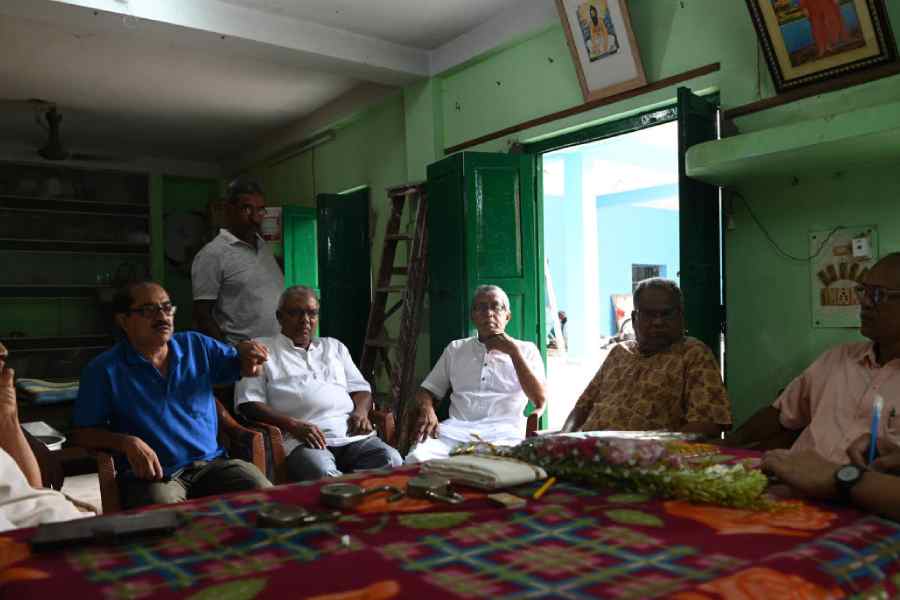The BJP is trying to woo their community with the Citizenship Amendment Act’s promise of fast-tracked citizenship. But Prabhas Mondal and Ipshita Thakur are not terribly interested: they believe they are already citizens of this country.
What concerns urban and educated Matuas — a sizeable segment of the community to which Prabhas and Ipshita belong — are unemployment, inequality and the rampant privatisation of education and health facilities, for instance.
Large numbers of Matuas — Dalits who, or whose ancestors, migrated from Bangladesh or the erstwhile East Pakistan — are settled in parts of southeast Calcutta.
Once denied entry into temples controlled by upper caste Hindus, they had built their own shrines that celebrated their Matua identity. These temples to Harichand Thakur, Shanti Mata and Guruchand Thakur — in localities like Mukundapur, Bagha Jatin and Kalikapur — remain crucial to their identity and culture even today.
The days of exclusion have ended but the temples stand as a testament to the Matuas’ decades of pain and suffering.
Some other things too have changed. Once known as “refugee colonies”, these pockets are now middle-class neighbourhoods with bougainvilleas blooming outside many homes. Some of Calcutta’s best-known hospitals are only a few minutes’ drive away. New condominiums spring up every once in a while.
So, at a time “Matua” is being used virtuously as a synonym for “CAA” this election season, conversations with young and educated Matuas over the past week threw up a different picture.
“I don’t see anyone from our group too bothered about the CAA. We have been citizens of this country for decades. Why should we have to apply for citizenship now?” said Prabhas Mondal, a member of the Matua Mission in Kalikapur.
The Mission organised a three-day Matua Sammelan, an annual affair, in Kalikapur early this month. There were no sessions on the CAA there.
“We mostly spoke about the teachings of Harichand Thakur and Guruchand Thakur, their role as social reformers,” Mondal said.
Ipshita Thakur, who works in the social welfare sector, said issues like unemployment and the privatisation of education and healthcare were at least as important to her this election as the promise of citizenship in a country where she was “already a citizen”.
“The Citizenship Amendment Act will not affect me because I was born here. At the same time, when I think deeply, I do worry about what will happen to my father or those of his generation if they are really asked to produce documents to prove their citizenship of India,” Ipshita said.
Ipshita’s father, now in his mid-70s, came over as a child in the mid-1950s from what is now Bangladesh.
Neither Ipshita’s father nor Mondal has applied for citizenship under the CAA. Nor do they intend to. In March, the Centre launched a portal asking non-Muslim immigrants from Pakistan, Bangladesh and Afghanistan to apply for citizenship.
Ipshita said her father held an Indian passport and had visited New York and Dhaka.
A Matua community member in his 50s, who requested anonymity, said: “I arrived in West Bengal when I was 12. Why should I be applying for citizenship now? I have voted and elected lawmakers. If I am an illegal immigrant, then their election is illegal.”
Most of these places — Bagha Jatin, Kalikapur, Mukundapur — fall within the Jadavpur Lok Sabha seat. Community elders said the Matua population here would be over one lakh. The constituency has over 20 lakh voters. Trinamool’s Mimi Chakraborty won the seat by 295,239 votes in 2019.
The largest concentration of Matuas in Bengal is in Thakurnagar, the headquarters of the All India Matua Mahasangha. How the community votes can influence the outcome in at least two Lok Sabha seats: Bongaon and Ranaghat. The BJP won both seats in 2019.
But the sizeable Matua population in Jadavpur constituency has not gone unnoticed, either. Trinamool candidate Sayani Ghosh visited the Bagha Jatin temple on May 9 morning before she began the day’s campaign.
“I went there to pay my tributes. The community members requested me to get the temple renovated. This area has a very high Scheduled Caste population,” Sayani told The Telegraph.
The temple in Rabindrapalli, Bagha Jatin, is the largest of the Matua temples in the area.
“It was set up in 1978 because our ancestors were not allowed into the temples of the upper castes. That is when some of them bought the land and established this temple,” said Malay Mandal, working president of the Harichand Seva Pratisthan, which runs the temple. Mandal is an employee of a central PSU.
Every year, in February, a weeklong celebration is held on the temple’s grounds. Bands playing instruments such as danka (a type of drum) and khanjani come from across Bengal. The temple complex houses a boys’ hostel, mainly for Dalit students.
An office-bearer of the Pratishthan who is in his mid-50s said this was the first time he had seen any political leader visit the temple as part of an election campaign.
An organiser of the Matua Sammelan in Kalikapur said there had been requests from the BJP and Trinamool to join the celebrations, but the organisers had declined.
Among Sayani’s rivals, CPM candidate Srijan Bhattacharya visited a Matua congregation, the Panchadal Utsav, in April.
BJP nominee Anirban Ganguly said: “I have interacted with them (Matua voters) several times, including once in Baruipur. These interactions are not only part of election campaigns.”
Srijan, the CPM nominee, said: “In our campaign, we are highlighting the role of Harichand Thakur as a social reformer and his role in the uplift of Dalits.”
Once set up as a mark of rebellion, the temples house idols of Harichand Thakur and his family.
“They have turned Harichand Thakur into a god, something he never wanted. Harichand Thakur was a social reformer who wanted the Matuas to get educated; he believed in the equality of all people,” said a doctor from the Matua community, now in his 70s and based in south Calcutta.










